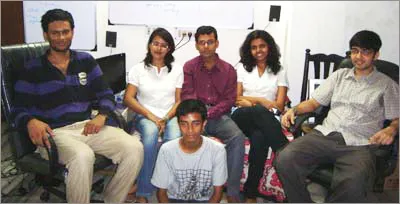Dreams do turn into reality, and blogs into businesses
“So, what do you do?”
“I’m a blogger.”
“Oh, that’s cute. And professionally?”
If you are a full-time blogger, the above exchange of judgments disguised as pleasantries is probably perched right on top of the list of perils of meeting peers.

Blogging used to be considered to be anything but a career- a mere hobby, a last resort for failed writers, even. At best, a vent for the passion harboured by bored middle-aged people, stuck in loveless marriages with their jobs because they had secretly always dreamed of consummating their relationships with their quills.
The scorn has eased up now - thanks to the digital revolution,which has been uniting even the quirkiest of subjects with an interestedaudience. And Digital India put the final nail in the coffin of all those who scoffed, by completely legitimizing a career in which your keyboard is your CEO.
There were some bloggers, though, who anticipated this eventual turn of events in their favor and invested their blood and sweat into building a virtual reality of their world. And together, they lead the charge with robust blogs and websites already up and running, even as the rest of the world scurries to get a grasp on how to digitize their operations. The puritans, I like to call them - who know nothing else but the internet. We had the fortune of speaking with five such companies who have been blogging since way before it was cool, who kept at it, and have, now that their ventures have become popular, earned some serious cheddar. Here are their spectacular journeys:
Kunzum
A travel blog with a heartfelt ideology, Ajay aimed to build an entity that would become synonymous with anything travel. Thus was born the umbrella brand Kunzum: at first, a travel blogger’s diary, then, the wildly popular website which led to the opening of Kunzum Travel Café, and now,Kunzum TV, their very own online channel of travelogues.

The idea:
“Kunzum started as a social enterprise. I wanted my blog to do its bit to sell the India travel story to the world at large, promote tourism, and create sustainable livelihoods,” says Ajay Jain, travel-buff-turned-entrepreneur. A blog was the obvious way to vent his heart out, until one thing lead to another, and - in a rather serendipitous turn of events - he now sits atop a mini-empire.
Why it was unique:
He really only wanted to show the world how splendid traveling is. The way he did somade all the difference, though. He not only created a popular place to find exquisite travel content online, but also built a great spot offline, the Kunzum Travel Café in Delhi’s HauzKhas Village.
Ka-ching:
“Being an entrepreneur in spirit, I could never stop at just writing content. I ventured into Kunzum as if I were on a journey, and allowed myself to be surprised at every milestone. And this is how Kunzum the business evolved.”
And evolve it did. While the blog reaches a network of over 70,000 subscribers, and a whole lot more through shares and social media, the travel café is making some ripples of its own. The space is a haunt for like-minded vagabonds who quench their insatiable desire to learn about new places and people by spending a day in this happy space,swapping experiences with strangers.
Popxo:
Priyanka Gill, an experienced lifestyle journalist with a flair for style, andNamrataBostrom, a management consultant who always spent a few hours a day staying up-to-date with the fashion world, were both looking to build something in the digital lifestyle space.
The idea:“The glossies were focused only on print, and there were only a handful of digital-first content websites that explicitly spoke to the young urban Indian women. And these women live their lives on social media and on their mobiles. We decided to create content that reached women where they were, and so we started POPxo.”

Why it was unique:
“Good content is the most effective means of curating products,” she said. Her content resonated with every woman out there, and helped many solve mundane everyday problems that weren’t so insignificant after all.
Ka-Ching:
POPxo has crossed more than a million users in its 7 months of existence, and gets more than 4 million pageviews monthly. Hussein Kanji, along with Google India Head RajanAnandan, CaratLane’sMithunSancheti (via Chennai Angels) and others, became angel investors when the venture was 7 months old - recently. The website raked in threecrores as a result.
The Malini of Miss Malini fame:
MissMalini is a paparazzo who everyone looks to for thelo-down on entertainment and showbiz. Not too many know that the pretty face on the website’s logo isbased on a real life MaliniAgarwal, the founder of the website. But Agarwal is not complaining- having her company and brand becoming an entity of its own, bigger than herself, is a delightful problemindeed!

The Idea:
In the entertainment journalism landscape, ruled as it is by big corporate houses, a website bringing insider news, posing as one of us,was bound to create a greater connect with the readers. She counted on cashing in on that innocent voyeuristic pleasure ofthe common people, andtheir interest in having one of their own getting them the dope from the inside. “There was also the element of luck and good timing, as I started blogging just as digital and social media started catching on in India,” says Malini.
Why it was unique:
Malini also felt there was a major gap in the market for content that represents and reflects the modern India she lives and breathes. Moreover, she saw a serious dearth in positive and happy reporting about the showbiz universe. Tired of the bitchiness and the sass that was the default tone of articles at the time, she decided to create happy content.
Ka-ching:
Since 2010, MissMalini.com has grown from a readership of 10,000 unique monthly visitors, to over 500,000 monthly visitors today. Their investors include prominent angel investors in India and the US, including RajanAnandan from Google India, the founders of Chegg.com, Match.com, SherSingh/Exclusively.in, the Asia Director of TA Associates, and other successful entrepreneurs, professionals and investors.
Style Fiesta
A tomboy at heart, MasoomMinawala stumbled upon the world of fashion, and, instead of learning its rules, decided to change them and make some of her own, onherhomegrown blog. This soon turned into a store and consequently, a reference point.

The Idea:
Initially, she just put up snippets of her own wardrobe as she dabbled around the frontiers of fashion, until she realized that her connect with her audience was solid enough for her to define fashion and trends herself, and slap her own filter on the way the world consumed style.
Why it was unique:
As she startedyoung, she spoke to the average girl not like a too-fancy-for-my-pants fashion magazine, but like a friend, a peer, with the same social life as them and the same needs as them. Also, she started documenting her fashion savviness way before most other bloggers fashioned this blog-business-model.This made her a pioneer, and the one brand one could instantly recall, by virtue of being the only mainstream one on the block for long.
Ka-ching:
Turning opportunities to action is an entrepreneur’s biggest virtue, and Minawala did just that. Starting an online shop of all her favorite jewellery was her next leap into the big game, and among the first few leaps taken in the field of e-commerce in general. The amalgam of both resulted in a diversified platformthat basically spells out what’s hot and what’s not in fashion for the youth!
Ipleaders.in
iPleaders.in has identified and fixed a problem that affects everybody who is anybody in the corporate sphere–it helps them keep lawsuits at bay by completely taking over the structuring and policies of the company, and ensuring they are compliant with everything they must be from a legal standpoint.

The Idea:
iPleaders was started with the vision of legal liability management, which strives to identify and eliminate risks from a business model so that one does not face legal problems. Apart from consulting, theyhave developed technology and risk management courses for startups and social sector entrepreneurs.
Why it was unique:
Aside from being crucial to any business, it also happened to be a one-of-a-kind concept. “When I started blog.ipleaders.in, there were hardly any visitors. We assumed no one wanted to read our blog posts,because we write on legal issues that may not interest the masses. However, thingsturned around soon. We now realize that people are very curious and have a great need for information when it comes to law,” says Ramanauj Mukherjee, founder of iPleaders, on how the platform finally took off as people saw the invaluable service they were offering.
Ka-ching:
By following good blogging practices while helping people with an issue they are genuinely concerned about, the traffic on theirportal has been seeing double-digit growth every month!
“Most visitors come from organic Google traffic,” reveals the founder-blogger Ramanuj Mukherjee, letting on how garnering readership is a mix of good content and strategic placement. Besides, they are also on-hire legal experts, willing to take over the complete legal to-do-list of your brand - and that’s got to mean big money! Besides, part of their opportunism is that they is that they fabricated a diploma program in Entrepreneurship Administration & Business Laws at National University of Juridical Sciences, Kolkata, which only adds to the scope of their legal prowess.







